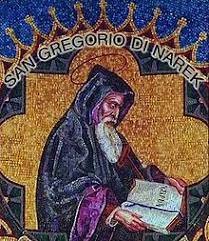HOMILY LENT WEEK 01 01 – Year I
Jesus, Justice, Love and Morality:
Optional Memorial of Gregory of Narek
(Lev 19:1-18; Ps 19; Mt 25:31-46)
******************************************
Why is it impossible to starve in a desert? Because you can always eat the “sand-which-is” under your feet!
The readings today are like a sandwich calling us to make justice our highest moral priority. They also reveal two surprising elements to our image of God.
In the book of Leviticus, the top slice of bread is holiness and the bottom one is love. The meat of this sandwich, according to Leviticus, tells us what love and holiness are all about: honesty, justice, fairness, respect and forgiveness.
Matthew, in the gospel, provides us with another sandwich. The top slice of bread in this case is Jesus on his throne of glory, while the bottom slice is eternal life. In between, Matthew describes what the criteria for eternal life is – charity pure and simple. Charity as feeding the hungry, giving water to the thirsty, visiting the sick, clothing the naked and visiting the incarcerated.
The first surprising element is that Jesus took an insignificant line out of the first reading (Lev 19:18, “You shall love your neighbor as yourself”), and placed it on an equal level as the Great Shema of Judaism (“Love God with your whole being”). The newness of Jesus’ teaching is that loving our neighbor as we love our selves, is just as important as loving God. In fact, it may be the best way to love God. As Jesus also put it, “Whatever you do to the least of these, you do unto me.” St. Paul, in Galatians 5:14, picks up that teaching in an even more radical manner. For him, “The whole law is summed up in a single commandment, ‘You shall love your neighbor as yourself.’”
The second surprising and striking element, especially given the focus of so many in the Church today on sexual morality, irregular marriages and the question of giving communion to those in civil marriages, is that there is no mention of any of these concerns in these readings!
Isn’t that interesting? Could there be a message here that we may have our priorities in the church slightly off target – so focused on matters of morality that we are excusing ourselves from taking more action in the messier area of social justice? Just a question to ponder.
Perhaps we should ponder both readings again with this perspective in mind?
 St. Gregory of Narek, whom we honour today, was a 10th century Armenian mink, poet and mystical writer and composer. His best-known literary work is a book of prayers, The Book of Lamentations. It is considered a masterpiece of Armenian literature. St. Gregory himself defined the work as an “encyclopedia of prayer for all nations” and hoped it would provide guidance in prayer for people of all walks of life.
St. Gregory of Narek, whom we honour today, was a 10th century Armenian mink, poet and mystical writer and composer. His best-known literary work is a book of prayers, The Book of Lamentations. It is considered a masterpiece of Armenian literature. St. Gregory himself defined the work as an “encyclopedia of prayer for all nations” and hoped it would provide guidance in prayer for people of all walks of life.
In 2021, Pope Francis inscribed St. Gregory of Narek, Abbot and Doctor of the Church, on February 27th as an Optional Memorial in the Roman Calendar. St. Gregory of Narek is recognized as a saint in both the Catholic and in the Armenian Apostolic Church, being venerated in a particular way among Catholics of the Armenian Rite.
The Eucharist is itself an experience of God’s unconditional love for us as sinners, through Word and Sacrament. It also commissions us to go out and to live these readings – to act justly, to love tenderly and to walk humbly with our God.



